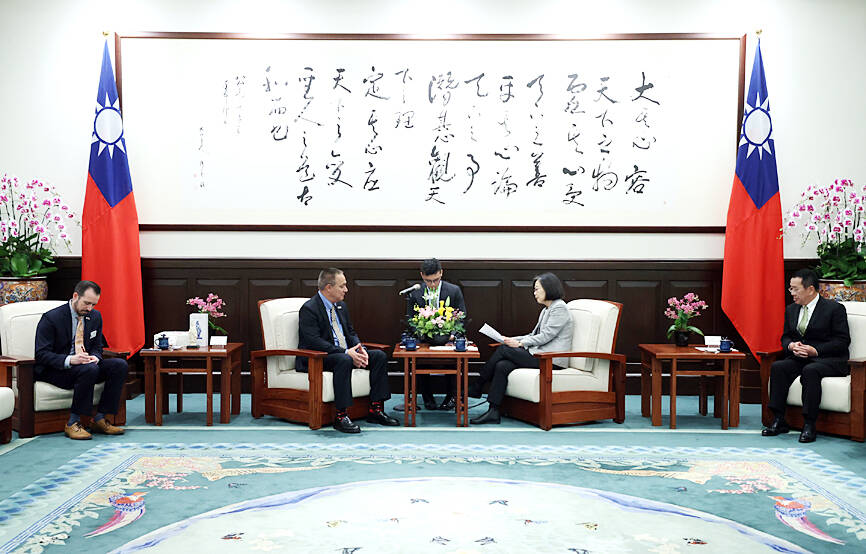Taiwan’s military would continue to conduct exchanges with the US to beef up joint operation capabilities, said the head of Taiwan’s navy, who is visiting the US.
Speaking to Taiwanese reporters on Monday while attending a maritime exhibition in Maryland, Navy Commander Admiral Tang Hua (唐華) said there is always room for further military exchanges and training between Taiwan and the US.
Such exchanges have to continue because times are changing, and the interoperability of the two sides’ forces would change as the two sides’ equipment and personnel evolve, he said.

Photo: CNA
Tang made the remarks when asked about Taiwan-US military cooperation on the sidelines of the Sea-Air-Space conference and exposition he is attending until today.
He is attending the expo with Wei Chung-hsing (魏中興), a defense attache at the Defense Mission in the US.
NATO defines “interoperability” as the ability of allies to act together coherently, effectively and efficiently to achieve tactical, operational and strategic objectives.

Photo: CNA
Specifically, interoperability enables forces, units and/or systems to operate together, allowing them to communicate and to share common doctrine and procedures, along with information about each other’s infrastructure and bases.
The conference in the US is being held by the Navy League of the United States, a national association with nearly 50,000 members who want a strong, credible US Navy, US Marine Corps, US Coast Guard and US Merchant Marine, it says on its Web site.
Meanwhile, Tang declined to answer when asked if he would be meeting with senior US defense officials during his stay.
Taiwan is launching a number of domestic shipbuilding projects and he is at the conference to look for potential cooperation opportunities and partners on these projects, Tang said.
Before attending the Maryland conference, Tang visited Hawaii, home of the US Indo-Pacific Command, for a Pacific Fleet change-of-command ceremony.
Senior Taiwanese defense officials, with the exception of the minister of national defense, regularly visit the US for such conferences.
In related news, Duane Sarmiento, commander-in-chief of the Veterans of Foreign Wars (VFW), yesterday in Taipei reiterated his group’s support for Taiwan during a meeting with President Tsai Ing-wen (蔡英文).
Sarmiento, who was elected in July last year to head the Missouri-headquartered VFW, told Tsai that the group planned to once again pass a resolution to call for continued support for Taiwan from the US Congress, the Presidential Office said in a statement.
He also expressed the hope that officials from the Veterans Affairs Council would get the opportunity to visit Washington for exchanges, the statement said.
It is the first time that Sarmiento has visited Taiwan, it said.
Sarmiento was accompanied by Ryan Gallucci, executive director of the VFW’s Washington office, it added.
In her remarks, Tsai thanked the VFW, a nonprofit veterans’ service organization, for its consistent support for Taiwan.
Tsai said that at the VFW’s national convention last year, at which she delivered opening remarks via videoconference, the group passed a resolution calling on the US government to deepen its partnerships with Taipei and assist Taiwan in strengthening its self-defense capabilities.
The solid ties between Taiwan and the US have been forged by friends in various domains, such as the VFW, which has established a “brotherhood alliance” with the Veterans Affairs Council, she said.
The VFW has long wielded significant influence on the US government’s veterans’ policy, Tsai said, adding that the government hoped that by exchanging best practices with the VFW, it could improve the welfare of Taiwan’s veterans and their families.
Tsai last month met a delegation in Taipei led by American Veterans national commander William Clark.

The CIA has a message for Chinese government officials worried about their place in Chinese President Xi Jinping’s (習近平) government: Come work with us. The agency released two Mandarin-language videos on social media on Thursday inviting disgruntled officials to contact the CIA. The recruitment videos posted on YouTube and X racked up more than 5 million views combined in their first day. The outreach comes as CIA Director John Ratcliffe has vowed to boost the agency’s use of intelligence from human sources and its focus on China, which has recently targeted US officials with its own espionage operations. The videos are “aimed at

STEADFAST FRIEND: The bills encourage increased Taiwan-US engagement and address China’s distortion of UN Resolution 2758 to isolate Taiwan internationally The Presidential Office yesterday thanked the US House of Representatives for unanimously passing two Taiwan-related bills highlighting its solid support for Taiwan’s democracy and global participation, and for deepening bilateral relations. One of the bills, the Taiwan Assurance Implementation Act, requires the US Department of State to periodically review its guidelines for engagement with Taiwan, and report to the US Congress on the guidelines and plans to lift self-imposed limitations on US-Taiwan engagement. The other bill is the Taiwan International Solidarity Act, which clarifies that UN Resolution 2758 does not address the issue of the representation of Taiwan or its people in

US Indo-Pacific Commander Admiral Samuel Paparo on Friday expressed concern over the rate at which China is diversifying its military exercises, the Financial Times (FT) reported on Saturday. “The rates of change on the depth and breadth of their exercises is the one non-linear effect that I’ve seen in the last year that wakes me up at night or keeps me up at night,” Paparo was quoted by FT as saying while attending the annual Sedona Forum at the McCain Institute in Arizona. Paparo also expressed concern over the speed with which China was expanding its military. While the US

SHIFT: Taiwan’s better-than-expected first-quarter GDP and signs of weakness in the US have driven global capital back to emerging markets, the central bank head said The central bank yesterday blamed market speculation for the steep rise in the local currency, and urged exporters and financial institutions to stay calm and stop panic sell-offs to avoid hurting their own profitability. The nation’s top monetary policymaker said that it would step in, if necessary, to maintain order and stability in the foreign exchange market. The remarks came as the NT dollar yesterday closed up NT$0.919 to NT$30.145 against the US dollar in Taipei trading, after rising as high as NT$29.59 in intraday trading. The local currency has surged 5.85 percent against the greenback over the past two sessions, central